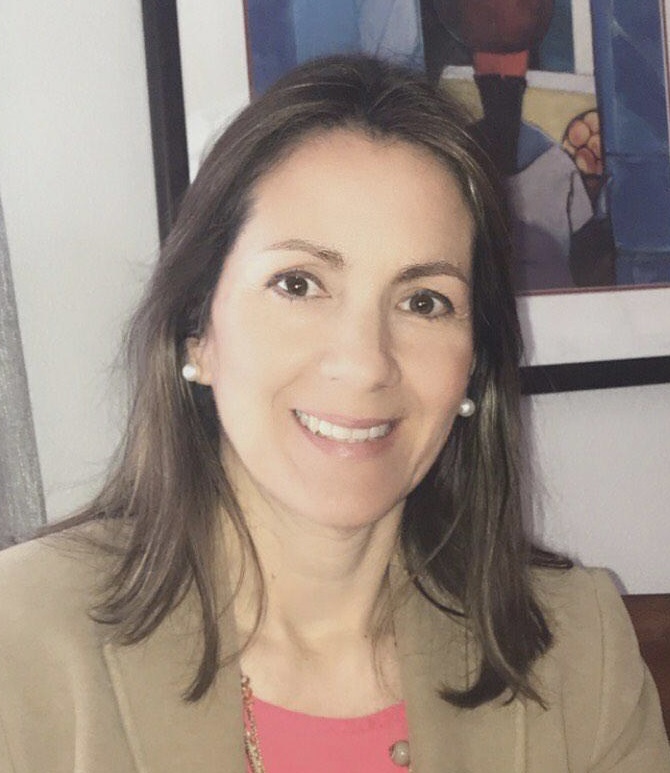Freelance Interpreter
JoJo Tuinstra

Susan Evans, M.A. (Master of Arts), Freelance Interpreter
Certified Court Interpreter, State and Federal Levels
Speaks Spanish, English
Born and raised in Venezuela and completely accustomed to hopping between there and the United States since she was seven, Susan considers herself an adept speaker of both Spanish and English. She’s been working as a freelancer for more than twenty years (since she moved to Idaho in 2000, it seems), and of course with that comes a certain amount of notoriety in her field—though she says she’s not afraid to also keep her family in mind—in fact, they’re her “first and foremost priority” when she’s considering taking up a new case. Some of her toughest moments were when she had to weather a bulky class-action lawsuit against over 40 companies, and another time when executives deeply nestled in a complicated power hierarchy from 2 different companies were being cut. She loves the freedom and chances for adventure abroad that conference interpreting can allow—though she always ensures she’s not acting in conflict of interest.
Question & Answer
How is proficiency in another language useful or important for Susan’s work?
As a translator, she had a huge leg-up in this area, having learned the language she needs to interpret for since birth. Therefore, she had the basics (and other stuff one should know) down at an L1 (native speaker’s) level and didn’t need to worry about getting rusty. Though she did say the workshop she took with the Idaho Supreme Court helped batten down some more obscure stuff, like legal terminology to know, that a layman wouldn’t necessarily need.
How is the ability to communicate and work with people from different cultural backgrounds useful or important in this field?
Many of the people Susan has had to work with are very poor and shy—they don’t feel like they have the right to advocate for themselves, don’t feel like using that right, and may be ashamed of their circumstances. In that case, you kind of have to help them realize that they’re valued and stay beside them as they take that journey. She also said that some people have uncommon indigenous languages as their L1, and have only a halting, incomplete grasp of Spanish as a prestige language. In this case, you should do your best to refer them to an interpreter knowledgeable in their L1, instead of trying to interpret their broken Spanish which may not quite be up-to-par.
What are some other skills that are important for success in this field?
As a person who has taken several interpretation classes before (well, 2), I (JoJo) can tell you that especially when interpreting simultaneously, they say timeliness is important to keep up with the speaker. You cannot fall very far behind or you’ll get lost. Often when interpreting extemporized speech, we must jot down pertinent facts on the case, personal information divulged by the client like birthdates, medical report summaries, &c, and abbreviate whatever exchanges occur with a slurry of shorthand. Some are somewhat standard, others are improvised by the interpreter through personal practice or on the spot. So the ability to pick out and summarize relevant information efficiently, I suppose, is something expected.
What did Susan do to prepare for this field?
Susan actually studied Economics, then switched to a Spanish Interpreting track. She honed and codified her proficiency in translation skills by taking a workshop with the Idaho State Supreme Court, which explained the guts of the legal system and helped shine light on some more obscure subjects like foreign-language legal terminology. Then, she took the four-part state certification test in Boise—beginning with a battery on worktime ethics problems, bilingual translation of visual media with 2-minute prep, then consecutive and simultaneous renderings of auditory speech. Then there was the federal test, which was a lot harder still.
How much has she usually been paid? Does she have to go far afield to find good opportunities?
She said there is no dearth of local opportunities, especially since COVID where we’ve discovered the joys and convenience of remote work. With tenure in your field as she has, though, the opportunities tend to seek you out anyway—it helps having your name on a roster, and she usually does just fine without bothering with LinkedIn, etc. Being certified as an interpreter in Idaho, you can make about $50 an hour with minimum 2 hours’ pay and paid mileage as well. If the trip is over 30 miles one way, you are paid half-time for your driving. If federally certified, you can charge a flat rate of up to $320 for up to a half-day (4 hours of work). And if interpreting privately (e.g. medical), you can charge yet more—though may choose not to by much, in the name of principle, as she does.
How does she think a proto-interpreter who’s let himself get out of practice a little (e.g. me, JoJo) get back in the game?
Susan says that the internet is your classroom when getting back into the field—well, maybe not a classroom, but a library. Sometimes, she says, it’s good to just shadow (basically the ultimate game of “jinx, you owe me a soda”, without even translating yet). Or if you want to pick up the pace, look for trials—to her, goldmines of new situations and new vocabulary—on Youtube to translate, listen to the radio and try to redub what they’re saying, or even try to translate a Spanish translation of a John Grisham paperback back to English in your head as you read it.
Reflection
The last interpretation class I took was Medical Interpretation with Fátima Cornwall at Boise State, probably two semesters ago. Since I helped DCI translate an exhibit about a non-binary dinosaur (may sound unrelated, but my teacher found a link! ), however, I’ve let my skills get rusty. And even though Fátima and I nos caemos bien, I already asked her a while ago about how to get back in the game. So for this assignment, I wanted to interview someone new that was still in my prospective field. And hey, while I was in the ring, why not ask them for tips? So while I didn’t want to box her into another interview, I didn’t think it was too bad to request a few leads. And that’s how I found Ms. Evans! Maybe this summer I’ll freshen up my skills, huh? Four months’ll be staring me in the face, after all.


